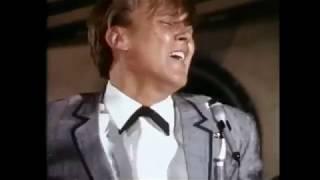North side
east side
little Willy
Willy wears the crown
he's the king around town.
Dancing
glancing
Willy drives them silly
with his star shooter
shimmy shuffle down.
'Way past one
and feeling alright
'cause when little Willy's round they can last all night.
Lay down
stay down
stay down
down.
'Cause little Willy
Willy won't go home
but can't push Willy round
Willy won't go;
try tellin' ev'rybody
but
oh
no
little Willy
Willy won't go home.
Up town
down town
little Willy
Willy drives them wild with his runaround style.
Inside
outside
Willy sends them silly
with his starshine
shimmy shuffle smile.
Mama done chase
Willy down thru' the hall
but laugh Willy laugh
he don't care at all.
Lay down
stay down
stay down
down.
'Cause little Willy...
Little Willy
Willy won't
Willy won't
Willy won't
little Willy
Willy won't
Willy won't
Willy won't.
Sweet's origins go back to 1965, with UK soul band "Wainwright's Gentlemen", which included drummer Mick Tucker and vocalist Ian Gillan. The group were limited to small UK clubs playing a mixture of R&B and psychedelia. Gillan quit in May 1965 to join Episode Six, and, later, Deep Purple. Gillan's eventual replacement was vocalist Brian Connolly. Tucker and Connolly remained with Wainwright's Gentlemen until early 1968.
In January 1968, Brian Connolly and Mick Tucker left Wainwright's Gentlemen to form another band, calling themselves The Sweetshop. They recruited a bass guitarist/lead vocalist named Steve Priest from a local band called 'The Army', having previously played with another local band 'The Countdowns'. Frank Torpey, a friend of Tucker's, was recruited to play guitar. It did not take long for Sweetshop to develop a following on the pub circuit, and they were signed to the Fontana record label. At the time, another UK band released a single under the same name Sweetshop, so the band shortened the name to The Sweet. Their debut single "Slow Motion" (July 1968) failed to chart. Sweet was released from the recording contract, and Frank Torpey left. Steve Priest in his autobiography says Gordon Fairminer was approached to play for them when Torpey decided to leave but turned the job down as they were only receiving £15.00 per week at the time.
With a new line-up now in place, a management deal was secured with a newly formed, and unknown song writing team, consisting of Nicky Chinn and Mike Chapman. Phil Wainman was the executive producer. This management deal also included a worldwide (except U.S.) record contract with RCA Records.
Sweet initially attempted to combine various musical influences, including 1960s bubblegum pop groups such as The Archies and The Monkees, with more heavy rock-oriented groups such as The Who. Sweet adopted the rich vocal harmony style of The Hollies, with distorted guitars and a heavy rhythm section. This fusion of pop and hard rock would remain a central trademark of Sweet's music.
Another influence on Sweet's music was 1960s drummer Sandy Nelson, who partially influenced Mick Tucker's drumming style. In particular, Sweet tracks such as "Ballroom Blitz" and "Man With The Golden Arm" contain elements of Sandy Nelson's 1961 U.S. Top 10 hit, "Let There Be Drums".
First album appearance
Sweet's first album appearance was on a Music For Pleasure release, but The Sweet had one side only, The Pipkins (after whose sole hit, "Gimme Dat Ding", the LP was titled) had the other. The LP features the A-side and B-sides of the three commercially unsuccessful Parlophone singles before Sweet finally found success with "Funny Funny", which was the band's first single release for RCA. Despite the album cover shot of The Sweet featuring Andy Scott, he was not actually a band member until "Funny Funny" and does not feature on any of these recordings. The band's guitarist then was Mick Stewart and wrote two of the featured B-sides on this compilation. The official release date was December, 1970.
In January 1971, Sweet made their UK television debut on a pop show called Lift Off, performing "Funny Funny".
International success
In March 1971, "Funny Funny" became their first international hit, climbing to the Top 20 on many of the world's charts. Although the next single, "All You'll Ever Get From Me" (May 1971) failed to chart, "Co-Co" (June 1971) became a hit (UK #2). But the following single, "Alexander Graham Bell" (October, 1971) was only a minor hit (UK #33).
east side
little Willy
Willy wears the crown
he's the king around town.
Dancing
glancing
Willy drives them silly
with his star shooter
shimmy shuffle down.
'Way past one
and feeling alright
'cause when little Willy's round they can last all night.
Lay down
stay down
stay down
down.
'Cause little Willy
Willy won't go home
but can't push Willy round
Willy won't go;
try tellin' ev'rybody
but
oh
no
little Willy
Willy won't go home.
Up town
down town
little Willy
Willy drives them wild with his runaround style.
Inside
outside
Willy sends them silly
with his starshine
shimmy shuffle smile.
Mama done chase
Willy down thru' the hall
but laugh Willy laugh
he don't care at all.
Lay down
stay down
stay down
down.
'Cause little Willy...
Little Willy
Willy won't
Willy won't
Willy won't
little Willy
Willy won't
Willy won't
Willy won't.
Sweet's origins go back to 1965, with UK soul band "Wainwright's Gentlemen", which included drummer Mick Tucker and vocalist Ian Gillan. The group were limited to small UK clubs playing a mixture of R&B and psychedelia. Gillan quit in May 1965 to join Episode Six, and, later, Deep Purple. Gillan's eventual replacement was vocalist Brian Connolly. Tucker and Connolly remained with Wainwright's Gentlemen until early 1968.
In January 1968, Brian Connolly and Mick Tucker left Wainwright's Gentlemen to form another band, calling themselves The Sweetshop. They recruited a bass guitarist/lead vocalist named Steve Priest from a local band called 'The Army', having previously played with another local band 'The Countdowns'. Frank Torpey, a friend of Tucker's, was recruited to play guitar. It did not take long for Sweetshop to develop a following on the pub circuit, and they were signed to the Fontana record label. At the time, another UK band released a single under the same name Sweetshop, so the band shortened the name to The Sweet. Their debut single "Slow Motion" (July 1968) failed to chart. Sweet was released from the recording contract, and Frank Torpey left. Steve Priest in his autobiography says Gordon Fairminer was approached to play for them when Torpey decided to leave but turned the job down as they were only receiving £15.00 per week at the time.
With a new line-up now in place, a management deal was secured with a newly formed, and unknown song writing team, consisting of Nicky Chinn and Mike Chapman. Phil Wainman was the executive producer. This management deal also included a worldwide (except U.S.) record contract with RCA Records.
Sweet initially attempted to combine various musical influences, including 1960s bubblegum pop groups such as The Archies and The Monkees, with more heavy rock-oriented groups such as The Who. Sweet adopted the rich vocal harmony style of The Hollies, with distorted guitars and a heavy rhythm section. This fusion of pop and hard rock would remain a central trademark of Sweet's music.
Another influence on Sweet's music was 1960s drummer Sandy Nelson, who partially influenced Mick Tucker's drumming style. In particular, Sweet tracks such as "Ballroom Blitz" and "Man With The Golden Arm" contain elements of Sandy Nelson's 1961 U.S. Top 10 hit, "Let There Be Drums".
First album appearance
Sweet's first album appearance was on a Music For Pleasure release, but The Sweet had one side only, The Pipkins (after whose sole hit, "Gimme Dat Ding", the LP was titled) had the other. The LP features the A-side and B-sides of the three commercially unsuccessful Parlophone singles before Sweet finally found success with "Funny Funny", which was the band's first single release for RCA. Despite the album cover shot of The Sweet featuring Andy Scott, he was not actually a band member until "Funny Funny" and does not feature on any of these recordings. The band's guitarist then was Mick Stewart and wrote two of the featured B-sides on this compilation. The official release date was December, 1970.
In January 1971, Sweet made their UK television debut on a pop show called Lift Off, performing "Funny Funny".
International success
In March 1971, "Funny Funny" became their first international hit, climbing to the Top 20 on many of the world's charts. Although the next single, "All You'll Ever Get From Me" (May 1971) failed to chart, "Co-Co" (June 1971) became a hit (UK #2). But the following single, "Alexander Graham Bell" (October, 1971) was only a minor hit (UK #33).
- Category
- Pop
Sign in or sign up to post comments.
Be the first to comment


